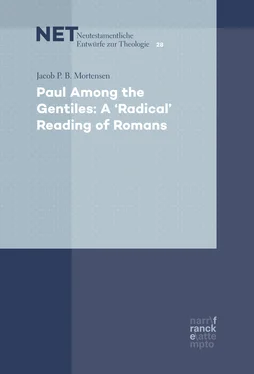With the foregoing in mind, we should note that the content of Rom 14:1–15:13 is completely comprehensible even in the absence of any Jews in the Roman congregation. ‘The weak’ may indicate Gentile ‘God-fearers’ or proselytes who observe the (Mosaic) law, and ‘the strong’ may indicate non-law-observing Gentiles. To reconstruct the Roman situation we need only to imagine some law-observing Gentiles refusing to eat meat served by those whose law-observance they had reason to doubt. Thus, to understand the prevailing situation, it is irrelevant whether the meat in question was from an impure animal, or from an incorrectly slaughtered animal, or other dubious connections.10 What mattered to the people in the Roman assembly was that it was considered κοινός. The whole point of the passage is that Paul does not demand cultic purity practice of Gentiles, which means that we should imagine the Jewish observances in view as practised specifically by Gentiles affiliated with Judaism. The whole reason Paul can speak obliquely about ‘the strong’ and ‘the weak’ without further qualification is that both groups are Gentile, but ‘the weak’ observe Jewish cultic practices, whereas ‘the strong’ do not. Because the non-law-observing Gentiles (in Christ) had stopped practising Jewish customs, the ongoing validity of the (Mosaic) law was at stake, since the law-observing Gentiles still did. If ‘God-fearers’ ate with those who were not ‘God-fearers’ ( i.e. non-law-observing Gentiles), they would probably have had concerns about the meat and wine, because the meat might have been sacrificed to idols. Such a situation would have led to tensions, and this would be a specific situation in which Paul would intervene, and write a letter with a specific occasion and purpose. Therefore, throughout chapters 1 to 11 Paul presents a situation where he constructs the situation of a fictive, Gentile ‘God-fearer’. This situation and theological dialogue serve as the foundation on which the specific exhortations of 14:1-15:13 build.
Many scholars infer ethnic Jewish addressees in Rome, and a Jewish constituency in the Roman congregation, because of the names Paul mentions in chapter 16.1 Prisca and Aquila are mentioned, and we know from Acts 18:2 that they were Paul’s Jewish co-workers. Paul had also referred to his fellow Jews as ‘compatriots’ or ‘relatives’ (συγγενής) in 9:3. He applies the same word in 16:7, 11, and 21 to Andronicus, Junia, Herodion, Lucius, Jason, and Sosipater. Thus, the argument is that since these must be Jews, the actual addressees of Romans must also contain Jews.
If we turn to LSJ and BDAG, we soon learn that the most common use of συγγενής is not ‘fellow national’, but ‘relative’ or ‘kin’. Words do receive their meaning through their use in a specific context, but the dictionary gives the most common use and meaning. In the New Testament, the word συγγενής appears six times outside the Pauline text, and on each occasion means ‘family member’.2 Romans 9:3 contains the only instance that deviates from this meaning, and this might cause us to pause. Also, in 9:3 Paul goes out of his way to firmly signal a use of συγγενής that differs from the most widespread one, by modifying it with κατὰ σάρκα. Thus, in 9:3 Paul specifically identifies an ethnic affiliation, but he does it by way of κατὰ σάρκα, instead of merely through συγγενής. This qualification is lacking in chapter 16! Besides, nothing in chapter 16 indicates a departure from the word’s usual meaning of ‘relative’, as occurs in 9:3. This argument e silentio does not automatically mean that Paul does not refer to ethnic Jews in chapter 16, but it does show a different and more widespread use of συγγενής than that chosen by those scholars who argue for a Jewish constituency in the Roman congregation. Hence, the argument e silentio is stronger because of the difference from the use of the word in 9:3, and because of the more common meaning of the word.
In addition to the foregoing observation, we must note that frequently, Paul metaphorically employs familial language when referring to members of his movement. For instance, he identifies his addressees as ‘brothers’ (1 Thess 1:4; 1 Cor 8:11; Phil 3:1). Epaphroditus and Timothy are his ‘brothers’ (Phil 2:25; 1 Thess 3:2), and Apphia is a ‘sister’ (Phlm 2). A believing wife is also a ‘sister’ (1 Cor 9:5). Paul calls himself ‘father’ (1 Cor 4:15; 1 Thess 2:11; Phlm 10), and Timothy and Onesimus are Paul’s ‘children’ (1 Cor 4:17; Phil 2:22; Phlm 10). The Corinthians are Paul’s ‘children’ (1 Cor 4:14; 2 Cor 6:13) and the patriarchs are ‘ancestors’ or ‘forefathers’ (Rom 9:5). Those who believe are ‘sons’ of Abraham (Gal 3:7), and those who belong to Christ are Abraham’s ‘offspring’ (Gal 3:29). Jesus is the firstborn of many siblings (Rom 8:29).
Throughout chapter 16, Paul also employs this metaphorical kinship language. Hence, Phoebe is Paul’s ‘sister’ (16:1), several of those greeted are Paul’s ‘beloved’ (16:5, 8, 9, 12), Rufus’s mother is Paul’s own mother (!) (16:13), and Paul also speaks of his ‘brothers’ and ‘sisters’ (16:14, 15, 17). Consequently, Paul’s wording in chapter 16 suggests that he constructs metaphorical family ties to the Roman congregation. Paul constructs a metaphorical family in which the genealogical relationship to Christ is prior to any ethnic relationship to parents. This affects the meaning of συγγενής in chapter 16. The mere use of the word συγγενής does not justify the conclusion that the persons thus described are Jews. And if we want to insist on the literal meaning of συγγενής, to imply historical-ethnic Jewishness, then we should be consistent and also insist on the literal meaning being that Phoebe is Paul’s biological sister, that Rufus’s mother is Paul’s biological mother, and of the others mentioned being Paul’s biological siblings. Otherwise, our reading strategy and logic will be inconsistent, eclectic and predisposed. Hence, these observations support the argument e silentio as presented above, where συγγενής does not mean ‘fellow Jews’. Additionally, the presence of Prisca and Aquila in Rome indicates a Gentile congregation – not a Jewish one. The reason for this is that we know from Acts that Prisca and Aquila may be associated with Paul’s mission to the Gentiles . The presence of Jewish missionaries to the Gentiles would affirm the Gentile identity of the Roman congregation. Therefore, the addressees of Romans should be considered Gentiles, and the doubtful presence of Jews in chapter 16 (apart from Prisca and Aquila) should not be taken to indicate a Jewish constituency in the Roman congregation. The arguments for a Jewish constituency simply do not convince.
The occasion and purpose of Romans – some preliminary insights
The final introductory questions we must address are, what were the occasion and purpose of Romans? We must ask whether Romans stands out from the other Pauline letters, meaning that the occasion behind this letter is less clear than it is in 1 Cor, 1 Thess, and Gal, for example. The many articles in Karl P. Donfried’s The Romans Debate has helped survey the options for decades now.1 Even though many options point in different directions, they may not be mutually exclusive. And even though Romans does appear to be more voluminous in the scope of its teachings, that may not make the occasion and purpose of the letter more elusive. However, here I consider the primary purpose of Paul’s letter.
For centuries, Romans was considered to be a summary of Paul’s theology. Philipp Melanchthon described Romans as a compendium of Christian doctrine,2 and more recently, Günther Bornkamm argued that Romans was Paul’s last will and testament.3 However, if Romans is a doctrinal letter or a testament for a congregation that Paul had not founded, then the specific interest – on the Roman side – evaporates. Why would the Romans be interested in this specific letter? Why would they be interested in a last will and testament more concerned with issues that would arise in Jerusalem than in Rome? And if we agree that Romans is to be perceived more as doctrine than as a specific letter, is it not peculiar that Paul’s understanding of the church, his treatment of the Lord’s Supper, the resurrection, or Christology is rather meagre? If Romans is presented as a theological treatise, it is hardly a comprehensive one. Also, any specific knowledge of the Roman congregation Paul betrays in the letter would undermine such a stance, since the focus would then shift from doctrine to a specific purpose and occasion. That is why those who think of Romans in such a way minimize the value of Rom 14–15 for reconstructing the situation at Rome.
Читать дальше












